We know why it’s so hard to adapt videogames to a screen.
It’s not just the change in medium. Ranking geek fandoms by their most vitriolic factions, gamers are pretty much at the top of the list, no longer just festering online, but spilling over into mainstream news and global politics. But The Last of Us feels different because no one can gatekeep the cultural knowledge that makes it so easy to engage with.
We know The Last of Us already, even if we’ve never picked up a controller.
But if expectation is the death of surprise, HBO’s The Last of Us has replay value all its own.
[Spoiler warnings for the first The Last of Us episode and game…]
Asking how HBO’s The Last of Us has avoided “the curse” of video game adaptations because of its near universal critical and audience acclaim almost feels like cheating, when Naughty Dog’s 2013 game was made with film in mind from the start.
Neil Druckmann’s story about a grizzled older man named Joel shuttling Ellie, a foul-mouthed teen girl, across a post-apocalyptic America was a game celebrated for wearing its influences on its tattered sleeve. Certainly The Walking Dead, then at the near-height of its popularity in a pre-streaming TV landscape, but also Lone Wolf and Cub, Cormac McCarthy’s The Road, and Children of Men most especially. While the stealth-based combat was fun and the fungus-infected Clickers were scary as hell, what people most remember about The Last of Us is the emotion, the haunting score by Oscar-winning composer Gustavo Santaolalla (Brokeback Mountain, Deadwood,) and the cut scenes that could’ve been directed by John Hillcoat or Rian Johnson.
Co-showrunner Craig Mazin understood the assignment when he chose The Last of Us as his next project after the success of his Chernobyl miniseries: try not to piss off the game’s fans too much while recognizing the opportunities of telling the same story in a new medium.
Easier said than done, looking at the last few years of game adaptations.
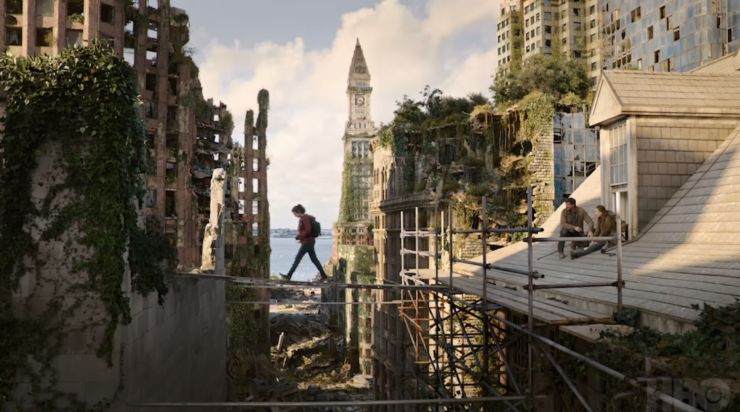
Naughty Dog has already had one box-office flop in its first major franchise film adaptation of Uncharted, which had a few familiar character names and set pieces, but otherwise bore little resemblance to its inspiration. It was basically a feature-length origin story for Sully’s mustache. Lost in production purgatory for years, the long-awaited movie strayed too far from the source.
But does that even matter?
Paramount+ still renewed its Halo series, even though gamers loathed its major changes to the franchise’s main players. Netflix’s Witcher: Blood Origins miniseries starred Michelle-freaking-Yeoh and still managed to be a cheap-looking cash grab with a script so predictable and poorly-written, any respectable SFF magazine would have given it a form rejection. Classic written-by-marketing-exec vibes. The flagship Witcher series is in even more turmoil in the wake of a weak second season and Henry Cavill’s sudden departure.
At least the books are still there.
Audience memories are short, as The Witcher’s first season was dinged for being too dense and confusing for a lot of critics and casual viewers, the most lucrative audience for a studio like Netflix. There was also an abundance of lore, that simultaneous gift and burden that must remained fixed to pass a fandom’s purity-test. Stray but a little and face public backlash that the showrunners have no clue what they’re doing while at the same time punishing new viewers who didn’t play the game or read the books.
There’s way less lore to an apocalypse story.
Especially now.
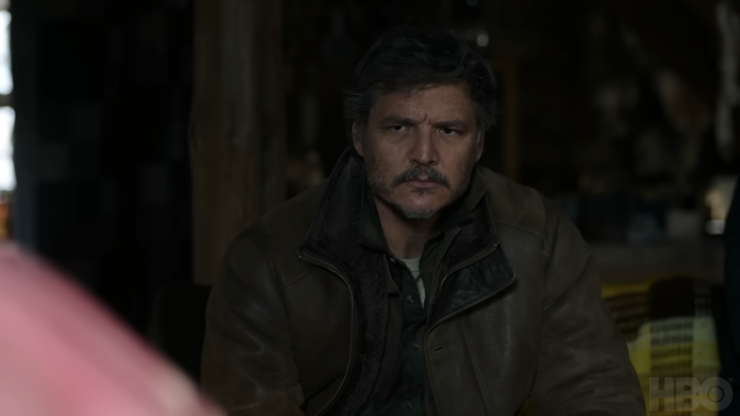
Mazin knows we’ve had eleven years of The Walking Dead and its tiresome spinoffs since The Last of Us sold its first of over 17 million copies. We know humans will be more ruthless than the zombies, that some will revel in the destruction, that good people will work together to rebuild a more just world. If anything, to coin a phrase from that other HBO show, True Detective, “Time is a flat circle,” and now a game that capitalized on a hit TV show, became its own hit TV show, necessitating a different conversation with its source, lest it be perceived as a degrading reproduction, fading with each subsequent copy.
We move past Outbreak Day quickly, because what more is there to say? The show opens with a panel of epidemiologists in 1968 explaining how the world’s not in danger of the zombifying Cordyceps fungus jumping from insects to humans… “so long as the temperature of the planet doesn’t increase.” Cue title credits.
Buy the Book
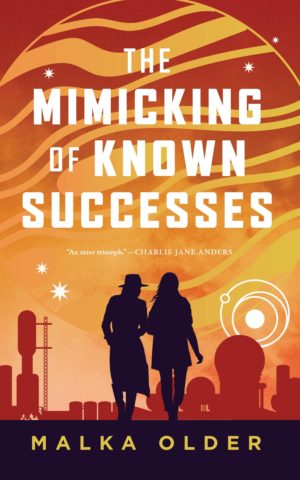

The Mimicking of Known Successes
We all know we will blithely bring about our own demise.
We know what the word pandemic means down in our bones.
Early scenes still follow Joel’s teen daughter Sarah (played by an ethereal, instantly loveable Nico Parker) in 2003, bearing witness to stores closing, friends and neighbors leaving town in a hurry… and it gave me a deeper anxiety I didn’t feel in 2013.
Sarah gets more quality time with her dad and her badass Uncle Tommy (Gabriel Luna), but the trio’s car ride out of Austin is no less tense for being nearly identical to the game’s opening level. That makes Sarah’s death via a faceless soldier’s gun no less shocking or emotional. The third episode is an entirely original story about Bill (Nick Offerman), a survivor who helps Joel and Ellie, and his relationship with his lover Frank, who was only briefly mentioned in the game. We get to meet Ellie (Bella Ramsey) before Joel does.
Anna Torv (Fringe, Mindhunter) particularly shines as Tess, Joel’s smuggling partner and sometimes-lover, as we watch her navigate the federal Quarantine Zone established in Boston. As in Chernobyl, Mazin is extremely effective at establishing distrust of the federal government, and FEDRA’s emergency response feels more authoritarian, more of a threat than it did in-game, making the Fireflies, the covert rebellion group, seem like a better option for Ellie’s future.
That’s all incidental window-dressing to the focus of The Last of Us’s story, which is not even will Joel and Ellie trust each other, but if it’s even possible that they can after their losses, after the world transformed.
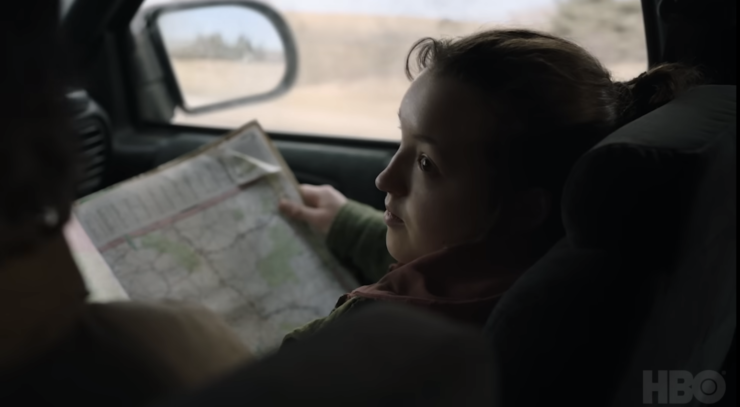
The casting of Bella Ramsey as Ellie was met with predictable outrage from the kinds of “fans” who hated The Last of Us Part II for not being straight, white, and male enough. The kinds of “fans” who think women can’t have muscles like Abby, or who get mad that that Ellie is gay despite it being confirmed in 2014’s Left Behind DLC, or that a trans character should exist at all. The kinds of “fans” who spent a decade fancasting Ellie with actresses who looked just like her character design and will not suffer anyone else, who seem disturbingly fixated on the sex appeal of a 14-year-old fictional girl.
Ramsey’s a great Ellie, and if you remember her as Lyanna Mormont on Game of Thrones—and how could you forget? “The North remembers!”—then you know she’s got the plucky action girl act down pat. But she gets a lot more range here, expressing a hardness beyond her years—a deep fear of abandonment and the weight of a future that she couldn’t understand rests on her shoulders. We know Joel already, too. We met him in Logan, and a dozen other stories of a tired old warrior with a cute kid sidekick. While it’s still a bit early not to see him as The Mandalorian, Pascal infuses Joel with grief and Ellie is certainly no Baby Yoda. The show hinges on their chemistry, and it works in gestures big and small.
Who is a game adaptation for, if not for the audience that doesn’t own a console?
I want people who will never buy a Playstation to finally understand why I’ve been saying The Last of Us is so great. I want to see the ruins of Pittsburgh without having to mash buttons to start a generator and run blindly from monsters. I want to watch new fans watch Those Moments, meet Those Characters that have haunted me for a decade. I want to have new debates about the morally gray choices Joel and Ellie and Tess must make.
And I want to be surprised that there’s something here for even me, who has explored every desk draw and read every discarded note in the game. (Will Ish be in the show? Will next season have a cold open with Part II’s Boris Legasov? I hope so.) And on that front, The Last of Us couldn’t be better because freed from the constraints of one or two playable characters and the need for thrilling combat mechanics, there’s more room for character moments, more humor, more pathos.
We know The Last of Us, but there’s a lot more room for all of us to play.
Theresa DeLucci loves stealth mode. Her fiction has appeared in Weird Horror, Strange Horizons, and Lightspeed. She’s also gotten enthusiastic about pop culture for Den of Geek and Wired.com’s Geek’s Guide to the Galaxy podcast. Find her sneaking past Clickers on Twitter.










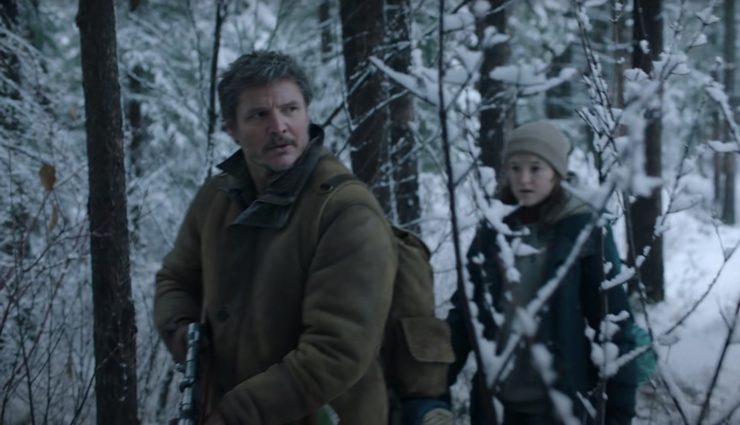
I’ve never played the game, but I really liked Episode 1.
Really enjoyed the first episode as well, can’t wait to see the resr
I never considered what a cold open to (season 2? will the first game stretch over multiple seasons?) would do to audiences. Like gosh darn if anything was meant to be adapted to a tv show it was these games more than any book ive read or game i’ve played. we are lucky to see it
Something cool from the “Looking Forward” trailer on HBO Go was that it seems like they’re incorporating the Ellie/Riley Left Behind DLC into in this season, as well. Looking forward to the clickers next epi (and the new/fleshed-out backstories for Bill, Sam/Henry, and especially David…)
@3 Everything I’ve read indicates that this first season is the first game, and the second season (I would imagine all but assured at this point) will be game 2 and then it will end.
Mazin has specifically stated that stories must have endings.
@3 Word on the street is season 1 is the entire first game and seasons 2 & 3 (if it makes it that far) will cover Part II, which was twice as long as the first.
Having seen only the first episode, I have three major thoughts:-
– This is an excellent adaptation of the video game, with just the right degree of expansion on the original.
– THE LAST OF US is much less entertaining after the full CoronaVirus experience
– I loathe the Zombie Apocalypse genre (and it’s apparently unending faith in the stupidity, hatefulness & anti-social tendencies of Humanity).
Hopefully I’ll be able to stick with the series, since it looks like a fine piece of work – my patience for dystopian fiction is, however, increasingly finite, so there’s absolutely no guarantee of my doing so (We’ll see how Episode 2 goes and then … well, we’ll see but we won’t necessarily keep watching).
“Who is a game adaptation for, if not for the audience that doesn’t own a console?”
Precisely — to present the story of that game to the audience, and not some other story related only by names and set pieces.
…Which is something Last of Us is succeeding at so far. The extra scenes they’ve added fit perfectly, and both lead actors are excellent.
But I think that is why a lot of audiences are frustrated with remakes and prequels at this point; a lot of them hinge on drastic changes or large additions that may seem necessary to carry a new audience, but ultimately reflect a different story and message, and not necessarily with skillful delivery. Part of what I like about this take is that the changes so far only enhance the original concepts — Joel is a poor veteran with a great actor behind him, Ellie gets a few moments to establish herself and her attitude, the Fireflies get to show off their position as desperate rebels for more than a few throwaway lines. This is the kind of increased depth that I think a lot of adaptations miss.
I’m not big on zombie movies, but because of the lead actors, and the positive buzz, I decided to give it a try, and was pleasantly surprised. The show was really engaging and well paced, and I am looking forward to seeing more.
Loved the first episode, watched it twice. I had no idea until I read a little background that it was based on a video game, Wow, cheers! Looking forward to all the episodes.